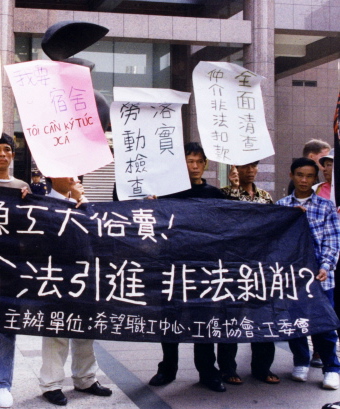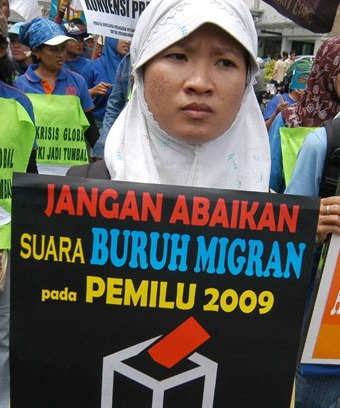Muhammadiyah’s response to the Coronavirus pandemic combines Salafi legal reasoning with medical pragmatism
The COVID-19 pandemic poses unprecedented challenges for Indonesian Muslims as the fasting month of Ramadan approaches. Muhammadiyah is one of many Muslim organisations planning for the fasting month in the plague year. From the outset of the pandemic Muhammadiyah leaders stated two things: First, that social isolation, translated into Arabic as at-tabāʻud al-ijtimāʻī to lend Islamic credibility to the concept, is the only measure through which the virus can be contained. Second, that this requires Muslims to change their religious behaviour.
Providing guidance on how Muslims can fulfil their religious obligations, while at the same time protecting themselves and the public from the contagion is a difficult task. As Ramadan approaches Muslim leaders would normally be preparing for the complex array of religious and social events that accompany the fast. Ramadan makes social distancing very difficult. It will be impossible to contain the pandemic if Muslims blithely continue with normal Ramadan observances. Still, the are many who worry that they will fall into sin and face divine retribution if they ignore their religious obligations.
There is also a tendency to confuse religious acts which are obligatory (wajib), others that are recommended because they were the practice of the Prophet Muhammad (sunnah) and others that are elements of Islamicate cultures. People are also reluctant to cancel non-obligatory events including such as communal fast breaking (iftar/buka bersama), daily Ramadan markets, religious talks (Tabligh Akbar), parades, parties, family gatherings, Id al-Fitri/Lebaran celebrations and most of all mudik that empties cities as people returns to their ancestral towns and villages at the end of the month. These are not religious obligations and are beloved elements of Indonesian Muslim cultures.
Muhammadiyah
Muhammadiyah is the largest and most influential Indonesian Islamic modernist organisation. It was founded in 1912 by Kyai Haji Ahmad Dahlan, a religious official of the Yogyakarta Sultanate. Ahmad Dahlan had two goals: To ‘purify’ Javanese Islam of what he believed to be bidah (unlawful innovation) and polytheism (shirk) and to promote modernity.
Muhammadiyah is a moderate Salafi movement influenced by the teachings of the 19th century Egyptian modernist Muhammad Abduh and the 14th century jurist Ibn Taimiyah. Muhammadiyah’s approach to theology, ritual and legal reasoning is based solely the Qur’an and Hadith (traditions concerning the Prophet Muhammad). Like other Salafi movements it opposes Sufism (Islamic mysticism) and devotional practices based on it. Unlike many other Salafi movements Muhammadiyah embraces local culture including theatre, music and dance. It rejects the Arabisation/Saudisation of social life characteristic of Indonesian movements inspired by Saudi Arabian Wahhabism.
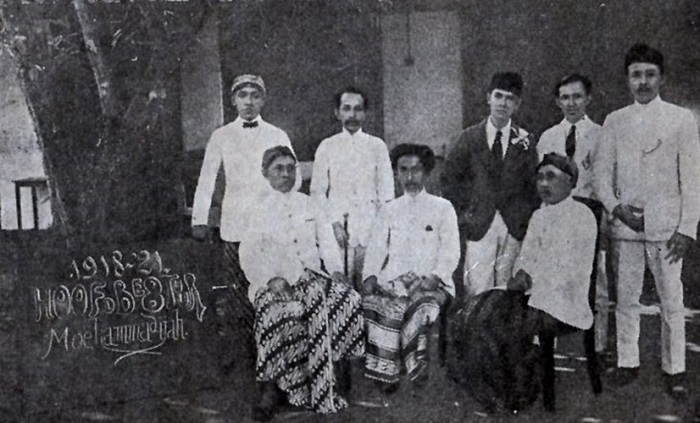
Muhammadiyah’s modernist agenda centres on education and healthcare. It operates a vast network of schools and universities the provide modern education in Muslim contexts, hospitals and healthcare centres. It now has approximately thirty million followers, most of them urban and middle class, making it Indonesia’s second largest Muslim organisation. Muhammadiyah regularly offers guidance to its members and followers on all manner of topics through sermons, religious talks held at mosques, publications including Suara Muhammadiyah, web portals and social media.
Religious guidance and the coronavirus pandemic
At times like these religious advice can make for sound public health policy and practice. Muhammadiyah’s response to the coronavirus pandemic combines Salafi legal reasoning with medical pragmatism. Like many other countries Indonesia was ill-prepared for the coronavirus pandemic. The first cases to be reported were in the first week of March. On 10 March, Muhammadiyah refocused its health care system on the prevention and treatment of coronavirus infections. Twenty hospitals in Java, Kalimantan and Sumatra were designated as Covid-19 referral centres. Over 30,000 branch offices of the Muhammadiyah Philanthropic Initiative and tens of thousands of mosques started public awareness campaigns.
Muhammadiyah began to offer religious advice as soon as the extent of the pandemic was apparent. On 19 March, the Muhammadiyah COVID-19 Command Centre published a text for a Friday sermon (khutbah), ‘Responding to the Corona Virus (COVID-10) Plague'.
The khutbah began with an objective account of the global scale of the pandemic:
At the moment, we are all confronted with the COVID 19 virus outbreak, also known as the corona virus. The World Health Organisation stated that the outbreak of this virus is a pandemic and a global problem. The Indonesian government has declared it to be a national disaster. This new kind of corona virus first appeared in Wuhan China in late 2019 and has now spread to more than 140 countries and territories. This corona virus outbreak is a non-natural disaster.
It continues with theological reflection on the interplay of divine determinism and human agency in responding to disasters. It encourages a combination of stoic acceptance, faith and determined action. These are basic themes in Muhammadiyah religious thought. I have heard references to worldly difficulties as tests of faith that demand determined action in Muhammadiyah sermons for more than four decades. This section of the khutbah is a commentary on a verse from the Qur’an.
And We will surely test you with something of fear and hunger and a loss of wealth and lives and fruits, but give good tidings to the patient (al-Baqarah 155)
This verse teaches us that disaster is something that every person must necessarily confront. Disaster, in whatever form it takes, is an expression of Allah's love for humanity. Things that happen to people are actually tests and trials of the faith and responses to things that people have done in the past. The believers’ faith in Allah will show them that the things that have befallen humanity are not exceptional problems, because humans will surely be tested with a variety of problems. Disastrous events are ordained by Allah. Takdir (divine decree) here means that Allah has determined what we now confront. Only Allah knows in advance what things he has determined. Humans can only discover them when they occur. People cannot know divine decrees in advance because only Allah is all-knowing. Thus, humans are obliged to ask Allah (for guidance) and try to react with patience in order to change the conditions they face for the better.
It concludes with advice to Muslims on how the should respond to the pandemic: First, to strengthen their faith in Allah because people of faith will not be afraid. Second, to practice social isolation including curtailing mosque activities including Friday prayers and religious talks (pengajian). Third, to help others who are in need.
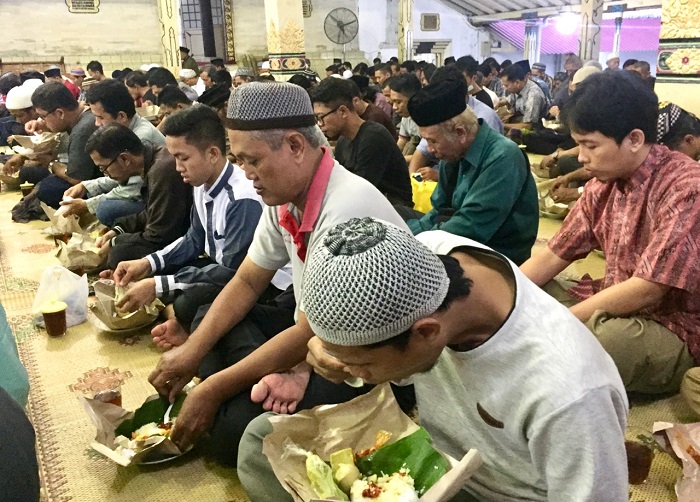
On 24 March, Muhammadiyah issued a fatwa stating that to struggle against the pandemic is a religious obligation and is ibadah at the same level as jihad. It also assured Muslims that it is not divine retribution, but rather a test for humanity in general and Muslims in particular. It reminded Muslims that according to the Qur’an ‘Whoever saves the life of one person, it is as if he saved all of humanity’ (al-Maidah 5:32). The fatwa also the suspended the normally obligatory congregational Friday noon prayers and advised Muslims to perform the zuhur prayer home instead. This portion of the fatwa was especially strong stating that under current conditions it is not possible to conduct the Friday congregational prayers.
Jihad against the pandemic
A 26 March press release offered more specific guidance for Ramadan. It made four basic points:
- Tarawih, special evening Ramadan prayers normally performed in mosques must be done at home. Religious gatherings that Muhammadiyah sponsors every evening during Ramadan will not be held this year.
- Fasting is obligatory for Muslims except those who are sick. The sick should follow the normal Shari’ah regulations for making up missed fasting days.
- Healthcare staff are not required to fast while on duty. They should follow the normal Shari’ah regulations for making up missed fasting days.
- It is not necessary to perform the communal prayer on Eid al-Fitr and the end of the month. People should not engage in customary activities, including iftar gatherings, returning to their home towns and villages to visit relatives at the end of the month, parades and social gatherings.
All of these recommendations are supported by dalil (proof texts) from the Qur’an and Hadith. Many of them require painful sacrifices.
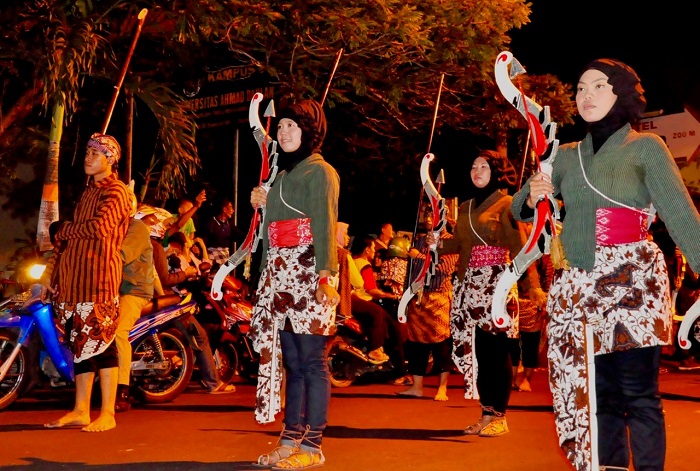
Tens of millions of Indonesians usually return to their home towns and villages for Lebaran. For city dwellers, it is their only opportunity to renew ties with relatives in the countryside. Another beloved custom that many will miss are Takbir Keliling processions, in which large groups of young people march through the streets chanting Allah Akbar on the eve of Lebaran. Some of these are simple torch lit processions. Muhammadiyah sponsors one in Yogyakarta with elaborate floats and in which thousands of young people dressed in traditional costumes parade through the streets.
Muhammadiyah leaders would not have advised Indonesians to ‘stay home’ without careful consideration of the risks posed by pandemic and the social, cultural and religious importance of Lebaran festivities. Postponing or cancelling them is, however, the most important thing Indonesians can do to slow the spread of the COVID-19 contagion. It will mean that many people who would otherwise have died will live to join in them next year.
Mark Woodward (mark.woodward@asu.edu) is Research Professor at the Center for the Study of Religion and Conflict at Arizona State University.



